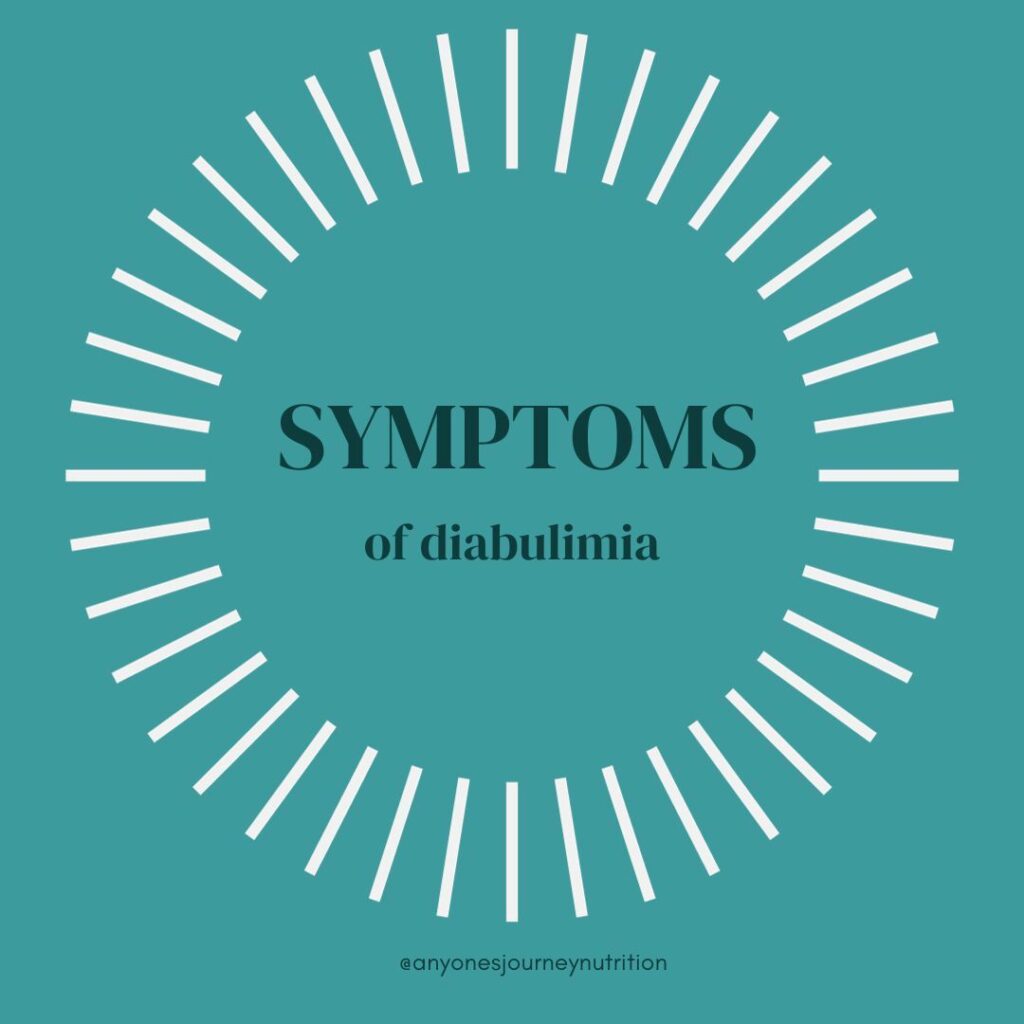While you may have heard of type 1 diabetes and eating disorders separately, the term “diabulimia” isn’t as commonly recognized.
This blog discusses the consequences, risk factors and diabulimia symptoms. Most importantly, we discuss what treatment looks like and the importance of seeking support.
It is time to shed light on this condition and offer hope, education and support to those struggling with diabulimia.
Whether you are concerned for a loved one or you yourself are struggling with diabetes management and disordered eating, we are here for you.
What is Diabulimia?
Diabulimia is a term used to describe a serious and potentially life-threatening eating disorder that primarily affects individuals with type 1 diabetes. It is sometimes referred to as the diabetes eating disorder.
It involves the intentional misuse or skipping insulin to lose weight or control one’s body shape.
Diabulimia combines elements of diabetes management with disordered eating behaviors that are similar to signs and symptoms of anorexia or bulimia nervosa.
These behaviors could include restricting, compulsive exercise, binging or use of laxatives to achieve desired weight in combination with the manipulation of insulin.
Health Consequences of Diabulimia
Diabulimia can lead to serious health consequences such as diabetic ketoacidosis or DKA, which can be life-threatening.
DKA occurs when the body does not receive necessary glucose, which leads to the breakdown of fats and production of ketones.
DKA symptoms include nausea, vomiting, abdominal pain, confusion, unexplained weight loss and fruity-smelling breath.
Over time, untreated diabulimia can also result in kidney damage, neuropathy, vision problems, heart issues and other medical complications.
How Common is Diabulimia?
According to the American Diabetes Association, diabulimia is more common that you may realize. It is reported that as many as ⅓ of women diagnosed with type 1 report insulin restriction to achieve weight loss.
It is especially common between the ages of 15 and 30.

Signs & Diabulimia Symptoms
Recognizing the signs and symptoms of diabulimia is crucial for early intervention and treatment. Like with many eating disorders, individuals may not exhibit all the symptoms and severity can vary.
If you or a loved one shows any of these symptoms or other concerning signs, seek professional help as soon as possible.
- Insulin Manipulation: One may intentionally reduce or skip insulin doses to induce a state of hyperglycemia (high blood sugar). Chronic high blood sugars can result in loss of calories through excess glucose in the urine.
- Weight Changes: Individuals struggling with diabulimia may see weight loss due to the body’s inability to properly utilize glucose for energy from the lack of insulin.
- Psychological Toll: Diabulimia can lead to guilt, shame, anxiety, depression as individuals not only handle the dangerous cycle of disordered eating but also fluctuating blood sugars.
- Increased Thirst and/or Urination: High blood sugars can lead to increased thirst known as polydipsia and frequent urination known as polyuria.
- Constant Hunger: Hunger can persist even after consuming food because of the body’s inability to properly use glucose for energy.
- Fatigue and Weakness: Chronic hyperglycemia can lead to a lack of energy and muscle weakness and loss.
- Dental Problems: High blood sugars can lead to dental issues such as cavities, gum disease and tooth loss.
Potential Risk Factors
Diabulimia is a complex condition with an interplay of psychological, social and physical risk factors. While the exact causes are not fully understood, several potential triggers of diabulimia include:
- Diagnosis of Type 1 Diabetes: The primary risk factor is having diabetes mellitus type 1 as this condition provides the opportunity to manipulate insulin doses and blood sugar levels.
- Body Image Concerns: Individuals with an obsession with body weight, shape or appearance may use insulin manipulation to achieve desired weight or gain a sense of control.
- History of Eating Disorders: Since type 1 diabetes can be diagnosed at any age, individuals with a history of eating disorders or disordered eating may be more susceptible to developing diabulimia.
- Stress and Trauma: High levels of stress, trauma or significant life changes can trigger disordered eating patterns and drive to use insulin manipulation as a sense of control.
- Lack of Diabetes Education: Limited understanding of diabetes management and the importance of insulin management can increase the risk. Some individuals, especially adolescents, may not understand the life-threatening behavior of skipping insulin doses.
- Access to Insulin or Medical Supplies: Easy access to insulin and ability to control its administration are necessary. The American Diabetes Association can be a great resource to help lower insulin costs and improve access.
Again, it is important to note that you or your loved one does not have to present with one of these risk factors for there to be a concern or further support needed.
Treatment for Diabulimia
A multidisciplinary approach is typically recommended for treatment as this team involves professionals such as doctors, endocrinologists, diabetes educators, registered dietitians, psychologists and therapists.
Medical nutrition therapy helps to monitor nutritional intake, insulin dosage adherence while providing expert guidance on carbohydrate intake. Plus, address any health complications resulting from insulin manipulation or body image concerns.
At Anyone’s Journey, our ultimate goal is to create an individualized treatment plan and to do this, requires a deep understanding of the client’s thoughts and feelings around food and their body.
Our clinicians value working at a pace that is comfortable for each client. It’s important to recognize, though, when a client requires that extra push to reach their recovery goals.
The accessibility of health information available to our clients can certainly be a contributor to some disordered thoughts and actions. Our job is to provide accurate nutrition information, backed up by science, so the client can start developing their own food philosophy that provides and nourishes their body appropriately.
We strictly offer outpatient treatment; however, we are skilled at referring clients to higher levels of care and helping individuals or families determine the appropriate level of care.
How to Ask for Help?
Diabetes is manageable but it is not always easy to live with type 1 diabetes. If you are also struggling with an eating disorder, coping with daily challenges can be overwhelming.
However, you do not have to navigate this journey alone. There are support group, friends, family and medical professionals that are ready to help you each step of the way.
It is important to know that asking for help is not a sign of weakness. Instead, it is the exact opposite. Seeking help or support allows you to have some of the weight lifted off your shoulders and not feel alone.
It is also never too early, nor too late, to seek guidance.
If you have a loved one struggling with diabulimia, gain access to our What to Say to Someone with an Eating Disorder guide.
All Eating Disorders Require a Personalized Approach
Overall, the information shared in this blog is meant for educational purposes and to provide a better understanding on the complexity of diabulimia. It is critical to remember that every eating disorder is different and requires an individualized approach.
Anyone’s Journey specializes in eating disorders and disordered eating with the approach that short strides result in long term possibilities. Our clinicians are also experienced in helping individuals that desire weight loss or are navigating chronic diseases.
Contact us by calling 612-638-2778, emailing contact@anyonesjourney.com or completing our New Client Form below.

